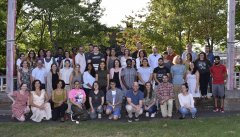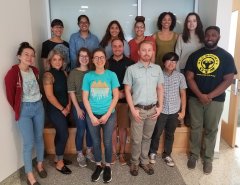News & Announcements
Past news and announcements are shown below. Current news is shown on our homepage.
NSB students continue with their accomplishments this semester
NSB students continue with their accomplishments this semester
Incoming NSB student Annabelle Flores-Bonilla was awarded an NSF GRFP. Annabelle will continue her research in the Richardson lab.
Emily Rothwell, a postdoc in the Lacreuse lab, was awarded a Society for Behavioral Neuroendocrinology travel award to present her work on sleep and cognition in the common marmoset.
Melise Edwards was awarded an NSF GRFP honorable mention and the CRF travel award, as well as a place in the 2020 CRF graduate grant writing program.
Rebecca Spencer Featured in Netflix Series and PBS NOVA Program
Rebecca Spencer Featured in Netflix Series and PBS NOVA Program
NSB faculty member and sleep researcher Bekki Spencer is featured in a new Netflix series called “Babies,” which debuts on Friday, Feb. 21 on the streaming service. “Babies” is a docu-series that follows 15 international families that were filmed over the course of a year and explores everything related to babies from the newborn stage to toddler. Spencer also will be featured on the PBS NOVA episode “Mysteries of Sleep,” which airs on Feb. 26. The program shows that during sleep, the brain performs several tasks that are essential to well-being and normal development: It processes emotions; it manages and stores memories; and it may also help people learn and remember new things. (Read more)
Student spotlight – Sarah Winokur
Student spotlight – Sarah Winokur
Neuroscience and Behavior PhD student, Sarah Winokur, received three awards to support her dissertation research: The Dissertation Fellowship from the Center for Research on Families, The Psychological and Brain Sciences Department’s Rayner Memorial Fund Award, and The UMass Amherst Graduate School’s Dissertation Research Grant. Read more
Andrea Silva-Gotay awarded D-SPAN NIH award
Andrea Silva-Gotay awarded D-SPAN NIH award
Neuroscience and Behavior graduate student Andrea Silva-Gotay was awarded the NIH Blueprint Diversity Specialized Predoctoral to Postdoctoral Advancement in Neuroscience (D-SPAN) Award. She was one of eleven awardees picked from a nationwide pool of applicants. This grant will support the completion of Silva-Gotay’s doctoral dissertation in the Richardson lab. Read More..
NSB Starts 2019 Fall Semester with Town Hall
NSB Starts 2019 Fall Semester with Town Hall
The NSB community gathered for a Town Hall during the second week of the semester. Over 50 faculty members, postdocs and students participated in multiple, lively conversations about our program--qualities we appreciate and wish to amplify, as well as areas for improvement. The Town Hall culminated in a walk across the lawn for a group photo.
Announcing the Inauguration of the On-Ramp Summer Pre-graduate Program
Announcing the Inauguration of the On-Ramp Summer Pre-graduate Program
The Interdepartmental Graduate Programs in the Life Sciences (IDGPs) launched a brand-new On-Ramp program for entering students on August 1st, with 18 soon-to-be PhD students participating. The month-long On-Ramp program is designed to facilitate the transition to graduate school by providing mentoring and professional development opportunities prior to the start of fall classes. Participants have the opportunity to work closely with a faculty member and current graduate students in a laboratory or in the field on research. In addition to hands-on training experience, On-Ramp students participate in lab meetings, journal clubs, and professional development workshops. On-Ramp students are paired with a graduate student peer mentor and join current students for social and programmatic events. There has been enthusiastic support for On-Ramp from all four IDGP graduate programs (MCB, NSB, OEB, and PB). We hope the On-Ramp Summer Research Program becomes a permanent part of the IDGP graduate experience at UMass.
Molecular and Cellular Biology Program
Neuroscience and Behavior Program
Organismic and Evolutionary Biology Program
Plant Biology Program
UMass researchers find sex differences in cognition of middle-aged marmosets
UMass researchers find sex differences in cognition of middle-aged marmosets
In a paper recently published in the journal e-Neuro, NSB doctoral recipient Matthew LaClair and his advisor Agnes Lacreuse examined what is a highly controversial topic in humans, by turning to the nonhuman primate, the common marmoset. The investigators asked whether biological sex modulates some aspects of cognitive performance as well as neural connectivity measures. They identified sex differences in cognitive flexibility that are correlated with sex-dependent patterns of resting brain networks. The findings support the idea that cognitive sex differences may have identifiable intrinsic neural correlates. Investigating the dynamics of cognitive sex differences and associated brain networks across the lifespan may shed a new light on sex-specific cognitive disorders.
Sex differences in cognitive flexibility and resting brain networks in middle-aged marmosets.
M. LaClair, M. Febo, B. Nephew, N.J. Gervais, G. Poirier, K. Workman, S. Chumachenko, L. Payne, M.C. Moore, J.A. King, A. Lacreuse, eNeuro. 1 July 2019, ENEURO.015419.2019; DOI: 10.1523/ENEURO.0154-19.2019
Sleep Secret:
Neuroscientist probes sleep’s role in learning and memory
Sleep Secret:
Neuroscientist probes sleep’s role in learning and memory
Does “sleeping on it” help us make better decisions? Are sleep disorders just a natural part of aging? How important are naps, anyhow? Rebecca Spencer, Professor in the Department of Psychological and Brain Sciences and director of the UMass Amherst Sleep Monitoring Lab is finding answers to these questions. Read More
Deater-Deckard and Team Study Adolescent Risky Decisions
Deater-Deckard and Team Study Adolescent Risky Decisions
Developmental psychologist Kirby Deater-Deckard, Psychological and Brain Sciences, Neurosciecne and Behavior Graduate Program, is a co-investigator on a recently renewed five-year, $3.7 million grant from the NIH’s National Institute on Drug Abuse to support a research team studying the environmental and neurobiological risk factors that influence brain development and healthy versus unhealthy decision-making in adolescence and early adulthood. Read more
Katz, Lyzinski to Explore Neuron-Level Mechanisms of How Brains Make Decisions
Katz, Lyzinski to Explore Neuron-Level Mechanisms of How Brains Make Decisions
Paul Katz, professor of biology and director of neuroscience, and Vincent Lyzinski, a network expert and assistant professor of mathematics and statistics, recently received a three-year, $3.5 million grant from the NIH’s National Institute of Neurological Disorders and Stroke for a new collaboration between researchers at four universities who will explore the neuron-level mechanisms of how the brain makes decisions.
The project is part of President Obama’s 2013 Brain Research through Advancing Innovative Neurotechnologies (BRAIN) initiative at NIH, which seeks to accelerate the development and application of new technologies leading to “a revolutionary new dynamic picture of the brain that, for the first time, shows how individual cells and complex neural circuits interact in both time and space.” Read more









